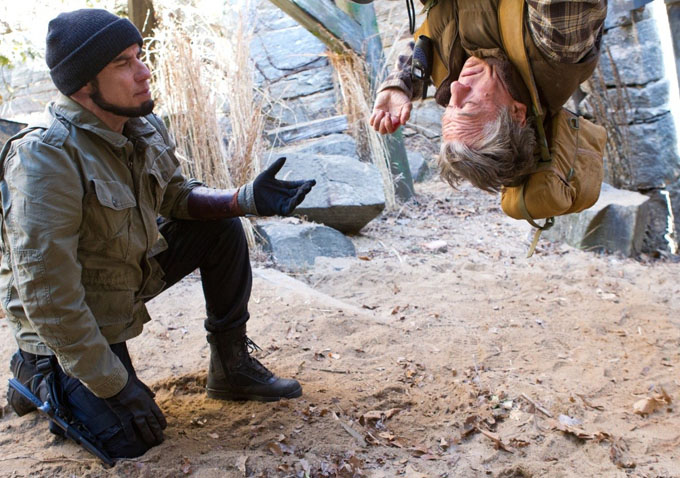 The deadening inevitability of “Killing
The deadening inevitability of “Killing
Season” is that, for all its bluster and violence, the picture’s going to end
on a ponderous note it can’t quite deliver convincingly. This barebones
time-killer from the ruthlessly frugal folks at Millennium Films announces its
intentions from the title on, and its two stars—Robert De Niro and John
Travolta—seem glumly game to scowl their way through the proceedings with the
professionalism of a mercenary, and the passion of one as well.
De Niro is Benjamin Ford, a
former-soldier-turned-recluse who screens all his calls from a secluded cabin
in the woods. That includes those of his son (Milo Ventimiglia), who is
baptizing his newborn child and wants Grandpa Shut-In to make an appearance. That
seems unlikely, though the film does a poor job of explaining whether Ford is
reacting to the broken marriage that separated him from the family, or the lasting
scars of war. To his credit, in a few brief moments, De Niro accurately
captures the reluctance of a father to open up to his child, finding a hidden
reservoir where the script has none. The suspicion about De Niro is that he’s
famously had issues with his late father; curious that, even given his late
career reputation, you can always count on De Niro to bring nuance to a
parental role, as long as he’s not lording over a Focker.
 Thousands of miles away, Ford
Thousands of miles away, Ford
doesn’t know that erratically-bearded Serbian soldier Emil Kovac (Travolta) is clutching a file containing all of Ford’s information. Ford was apparently
a soldier in the Bosnian War, and Kovac has a sharp memory. By the time Kovac
appears within walking distance of Ford’s cabin, Ford doesn’t realize this
gregarious foreigner has intentions. Claiming to be Bosnian, Kovas ends up
seated at Ford’s table, babbling on about war stories and discussing sexually
liberated nurses with equal aplomb. Travolta, a showy actor, seems to be
visibly concentrating on the nuances of the accent and dialect, to the point
where his physicality seems robbed of vibrancy, stiffened in accordance with
his vocal concentration. It’s a spirited effort, but it’s not acting, it’s
concentrating.
Kovac has his eye on Ford as
his next prey, but first he wants to cajole the former soldier to confess his
sins behind enemy lines. Kovac’s approach seems buried in a condescending idea
that Ford’s absolution comes from Christianity, not realizing that Ford doesn’t
worship at that altar, but the picture never squares away its feelings on
organized religion. Kovac is a believer, but he also takes into account the savagery
and brutality of the actions of war belong to a vengeful God. It’s a
complicated psychological balance that suggests a deep-seeded narcissism behind
Kovac’s convictions, entirely incompatible with Ford’s worldview, leading to a
cat-and-mouse chase where a gimpy-legged De Niro can suddenly become a mixture of
Rambo and Bourne in the wilderness.
 Director Mark Steven Johnson
Director Mark Steven Johnson
can’t seem to balance a tone here, which is a pity because for the most part he
stands back and lets the two stars go at each other. Most of “Killing Season”
feels like a cheap throwback to the Cannon era, where quick-shoot pictures like
this would be pitched every month, starring everyone from Charles Bronson to
Michael Dudikoff to Lee Marvin. There’s going to be men, there’s going to be
fisticuffs, and eventually, someone’s getting thrown off a mountain. At some
point, someone’s going to nostalgically fondle a photo of a child, a wistful
but clumsy reminder of a backstory the script didn’t bother to fill in. Pity a
mid-film distraction where the movie enters lurid torture territory, foggying
the waters about who is on proper moral high ground. A good filmmaker would
turn this into ambiguity. Johnson makes it seem like indecision; let’s
challenge the viewer with an unsympathetic moment with our protagonist! Let’s
also give ‘em some blood and gore, all this talking is going to bore them.
Despite the dubious Millennium
Films handprint and the picture’s low-key release schedule, this is a
down-and-dirty two-hander about two men damaged by the scars of war. Truly,
there are only so many ways you can screw that up, to the point where the man
behind “Simon Birch” keeps things moving well enough. Most of the time,
however, it feels like most of the picture is an attempt to pad out 91 minutes with nature footage to suggest Ford’s relationship with the woods.
Except that a telling mid-film conversation reveals that Ford bought the cabin
as is, with all the dead animals and weaponry located on the side of the wall.
He classifies it as “bullshit” as he presents Kovac with his father’s medal for
bravery, and suddenly, the idea seems transgressive: maybe Kovac is chasing a
marginal soldier, a company man at that. For the sake of fireworks and action,
however, Ford has to hold his own. Why have a man when you can have a super
man? [C-]

